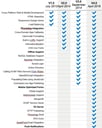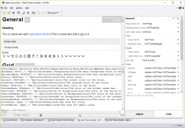Mobile application development tools or Rapid Mobile Application Development (RMAD) tools continue to gain popularity with organizations looking to accelerate mobilizing their business processes. TechTarget reporter Robert Sheldon recently wrote the article, “Eight factors when choosing mobile application development tools,” to help organizations select the right mobile app development tool for their organization.
While we feel there are additional criteria that companies must consider, such as offline operation, rich media storage, etc. (see our whitepaper, “7 Critical Capabilities Your Mobile App Development Software Must Include,”), we felt Sheldon does a good job identifying some of the criteria companies must consider when selecting a mobile application development tool. Here’s a high-level summary of the 8 factors he feels are key to selecting a mobile application development tool:
1) Usability – The app development tool’s interface should be intuitive and easy to use. Developers should test any tool - including conducting a free trial -- before making a purchase.
2) Costs - Development tools can be expensive, and sometimes additional modules are needed to get key functionality. Be sure the platform can do what it says and that the pricing is predictable as you scale.
3) Lifecycle management – Once an app is deployed, developers must test, host, deploy, maintain and analyze its usage throughout its lifecycle. As a result, it’s important for developers to consider the long-term capabilities and long-term costs of tools.
4) Security – The selected tool should allow your admin to use a device’s built in security controls, and governance and audibility are critical.
5) Integration – Sheldon reminds readers to consider how well the mobile app development tool integrates with the systems and services that touch the application throughout its lifecycle. In fact, mobile application management (MAM), may be necessary.
6) Expertise – Developers should be aware of the skills they'll need to utilize the product and what sample apps, professional services or training are offered by the vendor. We also suggest a careful look at the engagement and activity of the products’ user community as well.
7) Applications – Buyers must consider the type of apps they will be building, whether they be more simple web apps or more complex mobile – or hybrid – apps that perform more like native apps. Depending what your organization needs, make sure the tool can meet your requirements with an outstanding user experience.
8) Delivery – Apps aren’t done when they go into production. They must be dependable. They must scale. They will need updating based on evolving requirements and end user feedback. Developers need to make sure the app development tool they select will allow for easy upgrades, updates, availability, scalability and performance.
Read the full TechTarget article by Robert Sheldon.
Alpha Software’s whitepaper:“7 Critical Capabilities Your Mobile App Development Software Must Include,”.
While we feel there are additional criteria that companies must consider, such as offline operation, rich media storage, etc. (see our whitepaper, “7 Critical Capabilities Your Mobile App Development Software Must Include,”), we felt Sheldon does a good job identifying some of the criteria companies must consider when selecting a mobile application development tool. Here’s a high-level summary of the 8 factors he feels are key to selecting a mobile application development tool:
1) Usability – The app development tool’s interface should be intuitive and easy to use. Developers should test any tool - including conducting a free trial -- before making a purchase.
2) Costs - Development tools can be expensive, and sometimes additional modules are needed to get key functionality. Be sure the platform can do what it says and that the pricing is predictable as you scale.
3) Lifecycle management – Once an app is deployed, developers must test, host, deploy, maintain and analyze its usage throughout its lifecycle. As a result, it’s important for developers to consider the long-term capabilities and long-term costs of tools.
4) Security – The selected tool should allow your admin to use a device’s built in security controls, and governance and audibility are critical.
5) Integration – Sheldon reminds readers to consider how well the mobile app development tool integrates with the systems and services that touch the application throughout its lifecycle. In fact, mobile application management (MAM), may be necessary.
6) Expertise – Developers should be aware of the skills they'll need to utilize the product and what sample apps, professional services or training are offered by the vendor. We also suggest a careful look at the engagement and activity of the products’ user community as well.
7) Applications – Buyers must consider the type of apps they will be building, whether they be more simple web apps or more complex mobile – or hybrid – apps that perform more like native apps. Depending what your organization needs, make sure the tool can meet your requirements with an outstanding user experience.
8) Delivery – Apps aren’t done when they go into production. They must be dependable. They must scale. They will need updating based on evolving requirements and end user feedback. Developers need to make sure the app development tool they select will allow for easy upgrades, updates, availability, scalability and performance.
Read the full TechTarget article by Robert Sheldon.
Alpha Software’s whitepaper:“7 Critical Capabilities Your Mobile App Development Software Must Include,”.




Comment